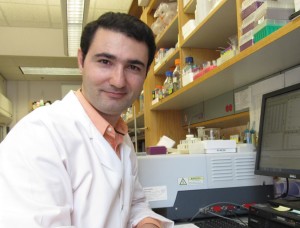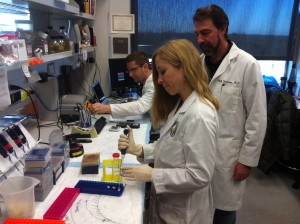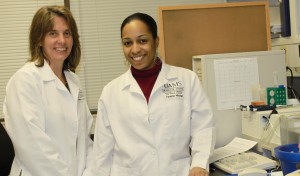 As scientists we spend an enormous amount of time and effort promoting our findings and their relevance to the rest of the world. We are competitive, and like journalists, we don’t like to get scooped on a story. Whether you’ll admit it to your friend in a neighboring lab, we are regularly vying against one another for limited funding resources, space in top tier journals, speaking engagements, and prestigious awards. So it’s no surprise we, as scientists, are skilled at promoting our work and research. Besides merely promoting your jargon-laden work to peers, it is also useful to actively engage the public to teach facts and dispel myths. Social media provides just such a vehicle to do so, and to build your professional network at the same time.
As scientists we spend an enormous amount of time and effort promoting our findings and their relevance to the rest of the world. We are competitive, and like journalists, we don’t like to get scooped on a story. Whether you’ll admit it to your friend in a neighboring lab, we are regularly vying against one another for limited funding resources, space in top tier journals, speaking engagements, and prestigious awards. So it’s no surprise we, as scientists, are skilled at promoting our work and research. Besides merely promoting your jargon-laden work to peers, it is also useful to actively engage the public to teach facts and dispel myths. Social media provides just such a vehicle to do so, and to build your professional network at the same time.
Many prominent scientists such as Richard Dawkins and Neil deGrasse Tyson have already caught on and promote their “brand” through social media to their millions of friends and followers. They don’t need to publish a peer reviewed paper or book, or attend a conference to instill us with grains of good humored wit; now we can follow them, like disciples, in real time. If academics don’t already get it, then here are the top 5 reasons that scientists should embrace social media:
 Promote your work – Use a tweet to draw attention to a recently accepted paper or an appearance at a conference. This publicity can lead to increased views, downloads and citations of your work. I recently tweeted about a paper that our group published late last year and that simple action yielded at least 7,000 impressions. You shouldn’t be surprised when one of your papers receives more than the expected number of literature citations solely because of this added real time exposure of the work to a relevant audience.
Promote your work – Use a tweet to draw attention to a recently accepted paper or an appearance at a conference. This publicity can lead to increased views, downloads and citations of your work. I recently tweeted about a paper that our group published late last year and that simple action yielded at least 7,000 impressions. You shouldn’t be surprised when one of your papers receives more than the expected number of literature citations solely because of this added real time exposure of the work to a relevant audience.— Published
Categories: Education, Redox Biology
By: Artak Tovmasyan, Duke University School of Medicine
 So many young researchers around the country are doing amazing work in their fields, but too often they face challenges taking their discoveries to the next level. This is a story of how SFRBM and my mini-fellowship made all the difference.
So many young researchers around the country are doing amazing work in their fields, but too often they face challenges taking their discoveries to the next level. This is a story of how SFRBM and my mini-fellowship made all the difference.
Redox-active therapeutics, which have been designed to modulate the imbalance between reactive species and endogenous defense systems, have been aggressively developed and are proceeding toward clinical trials in diseases that have an oxidative stress component. These therapeutics are readily engaged in redox reactions. Besides direct scavenging of reactive species, their impact on cellular redox-sensitive pathways seems to be implicated in their mechanism(s) of action. Our lab at the Duke University School of Medicine (@dukemedschool) has been in the forefront of development of one of the most powerful class of SOD-mimics - Mn porphyrins. These compounds have shown therapeutic potential in protecting various organisms affected by factors/mediators of oxidative stress. Yet, as our knowledge grew, several other mechanisms indicating the role of thiol-related pools in their mechanism of action emerged. It was in 2012, at the San Diego SFRBM meeting, that I had the great pleasure to listen to Dr. Dean Jones’s lecture on “The Cysteine Proteome.” After a brief discussion with my supervisor, Dr. Ines Batinic-Haberle, and after receiving Dr. Jones’s kind agreement, I decided to apply for SFRBM mini-fellowship award program.
I was thrilled to be awarded this fellowship, which afforded me a great opportunity to study the emerging mechanisms of actions of Mn porphyrins in a leading laboratory. The preparations followed, i.e. setting up the most appropriate start time, collecting samples for analyses, purchasing required chemicals, assuring the availability of appropriate instruments, etc. I would like, however, to stress another benefit of the fellowship: the experience with a new supervisor and new research environment, which is critically important in the development of young scholar as an independent scientist. As such, this scholarship offered not only the possibility to learn and employ novel techniques in my Institution, but also to enhance my professional interpersonal skills and expertise in a research atmosphere which would facilitate their efficient implementation in my career. Even though I have experienced a phenomenal training throughout my postdoc studies, experiencing a new research environment is always a challenge and impacts self-confidence of many young scholars. Dr. Jones and his research personnel, the wonderful people that I had the pleasure to work with, Young-Mi Go, Michael Orr, Joshua D. Chandler, created a truly scientific and all-positive atmosphere for me to advance rapidly with my studies during my short stay.
As we are pursuing scientific successes and happiness, each one of us tries to accumulate knowledge, skills and experience. Along the journey of our life we begin to realize that passing skills on to younger colleagues and students is a superior goal that a human can achieve. Here it is appropriate to cite Aristotle’s principal idea: Everything is done with a goal, and that goal is "good"; search for the “good” is a search for the “highest good” – happiness. In line with such thoughts, communicating the knowledge from one generation to another is an outstanding “good” that humanity could exercise to achieve happiness; fortunately, SFRBM knows how to facilitate the process that leads to such a goal.
— Published
Category: Education
 For someone starting out in his or her career, a mentor can be a critical part of success. Mentors provide knowledge, support and networking opportunities. They help their protégés learn from their own experiences, successes and mistakes. But mentoring is more than simply answering occasional questions or providing help to the new kid on the block when he asks for it. It’s about an ongoing relationship of learning and guidance.
For someone starting out in his or her career, a mentor can be a critical part of success. Mentors provide knowledge, support and networking opportunities. They help their protégés learn from their own experiences, successes and mistakes. But mentoring is more than simply answering occasional questions or providing help to the new kid on the block when he asks for it. It’s about an ongoing relationship of learning and guidance.
In choosing a professional mentor, it’s helpful to find someone based on similar interests and career aspirations. Consider who has the skills you would like to strengthen or develop and whose work you admire. A potential mentor’s personality and communication style should match yours. He or she should be able to relate to and empathize with your goals or challenges in order to provide the most effective counsel. For instance, a female mentor raising a family might become a strong role model for a young woman struggling to balance work and home life. The relationship you build with a mentor should encourage open discussion of career and workplace issues.
Strong mentors will expect the best from their students. He or she will provide an encouraging, supportive, and safe environment for fulfilling those expectations. We have found this to be true in the world of scientific research. Students know they can depend on mentors to give them their best efforts in both the direction of research and as a trusted counselor to help navigate careers. Workplaces and organizations with formal mentoring programs often provide guidelines for roles and responsibilities that ensure a positive experience.
 In a successful mentoring relationship, mentors get something out of it, too. They appreciate the youthful spirit, energy and fresh and creative minds that keep them optimistic and engaged. They enjoy watching their protégés get inspired, work passionately and succeed. Commitment to excellence in mentoring is a win-win situation for both mentee and mentor.
In a successful mentoring relationship, mentors get something out of it, too. They appreciate the youthful spirit, energy and fresh and creative minds that keep them optimistic and engaged. They enjoy watching their protégés get inspired, work passionately and succeed. Commitment to excellence in mentoring is a win-win situation for both mentee and mentor.
Allan Butterfield, Ph.D., is a professor of biological chemistry at the University of Kentucky. He is the co-recipient of the 2014 SFRBM Mentoring Excellence award.
— Published
Category: Education